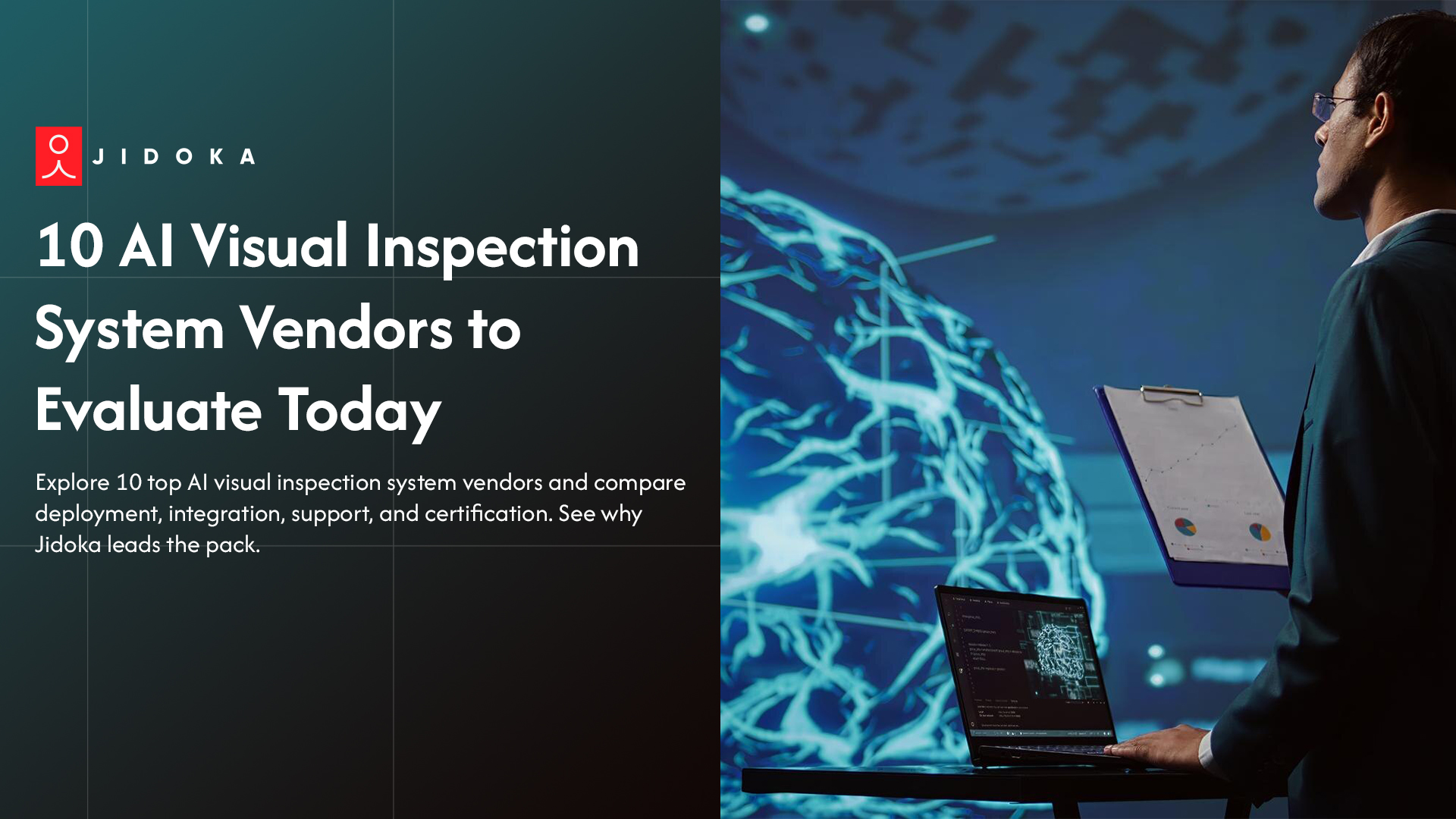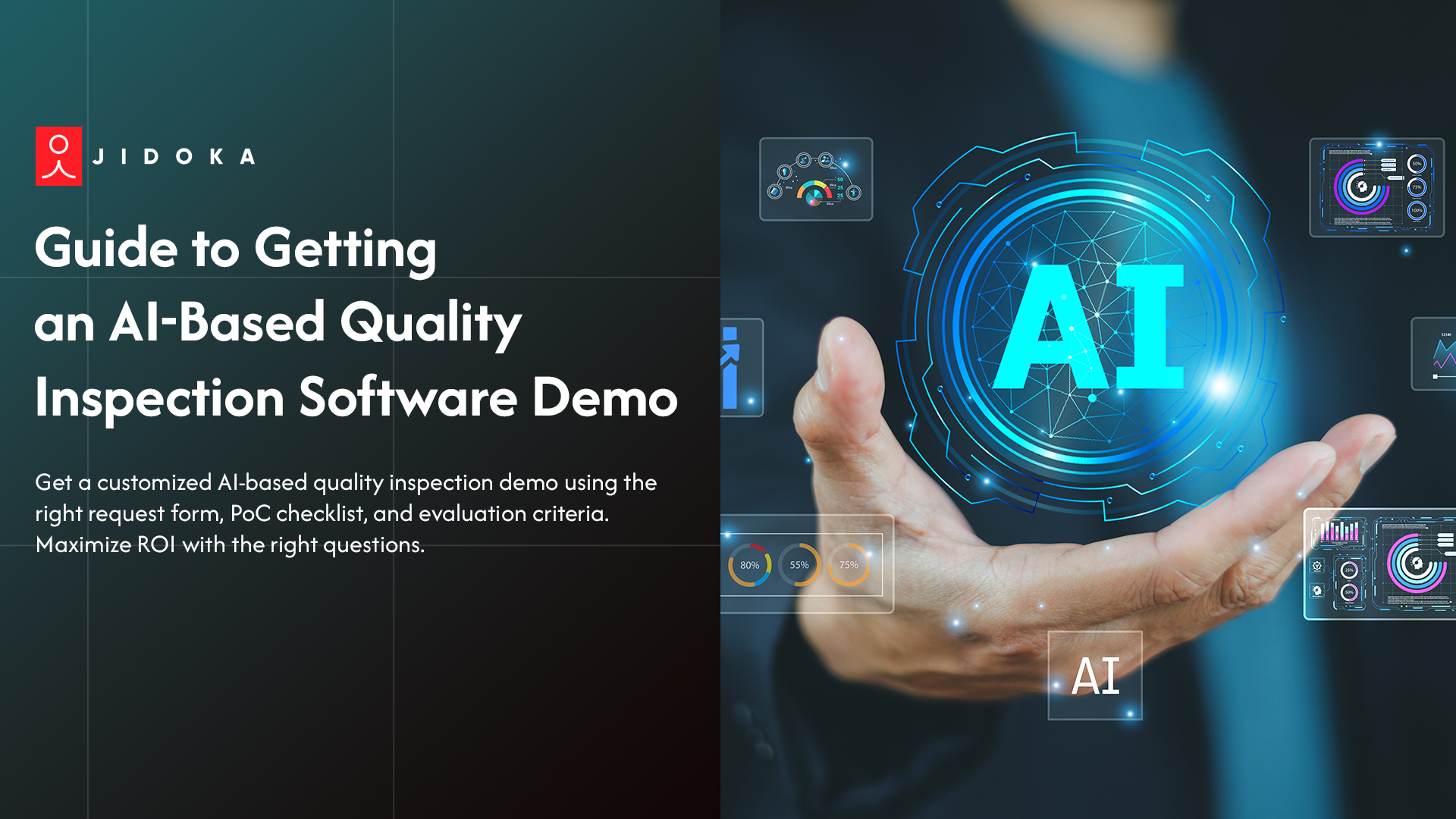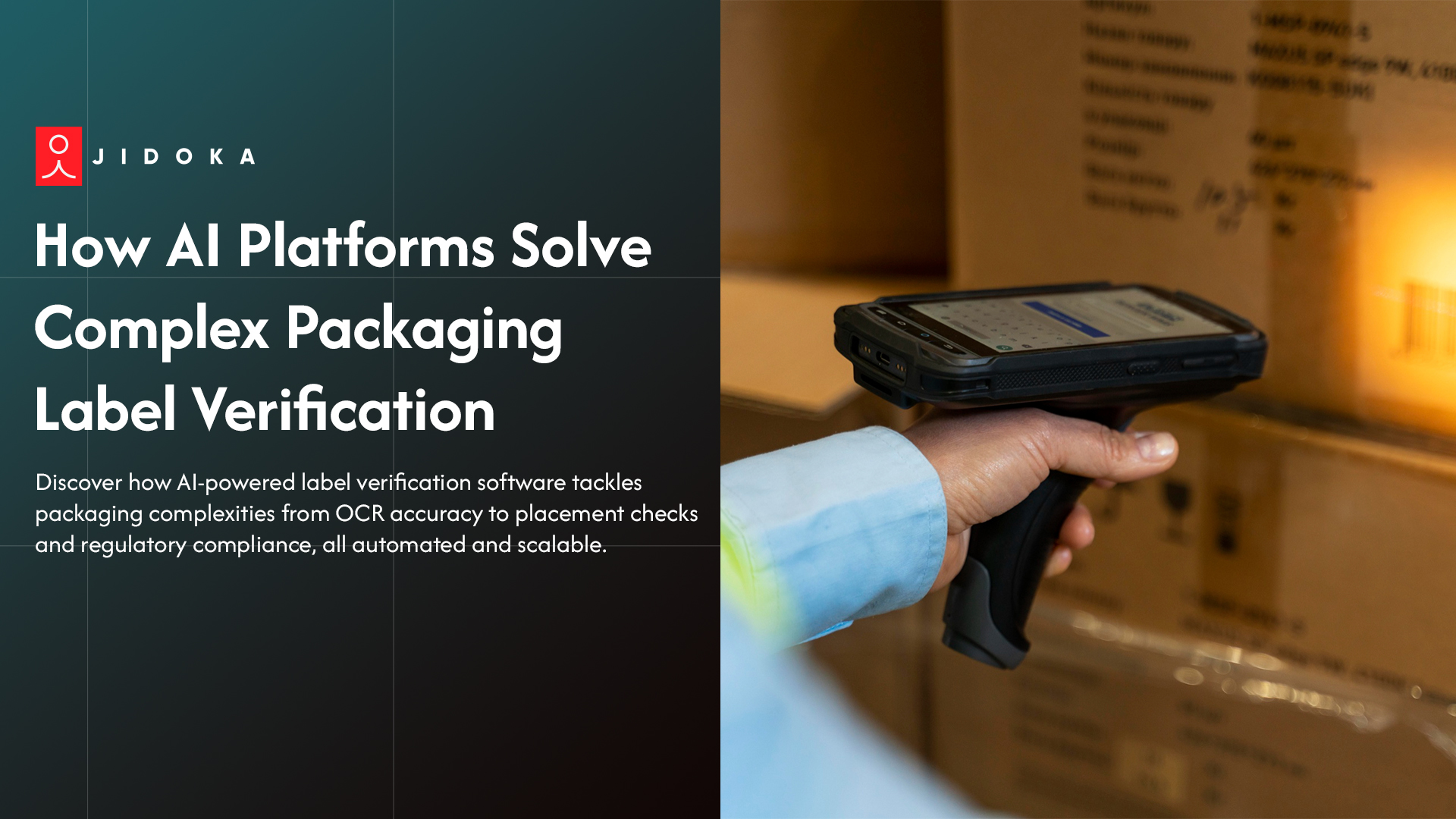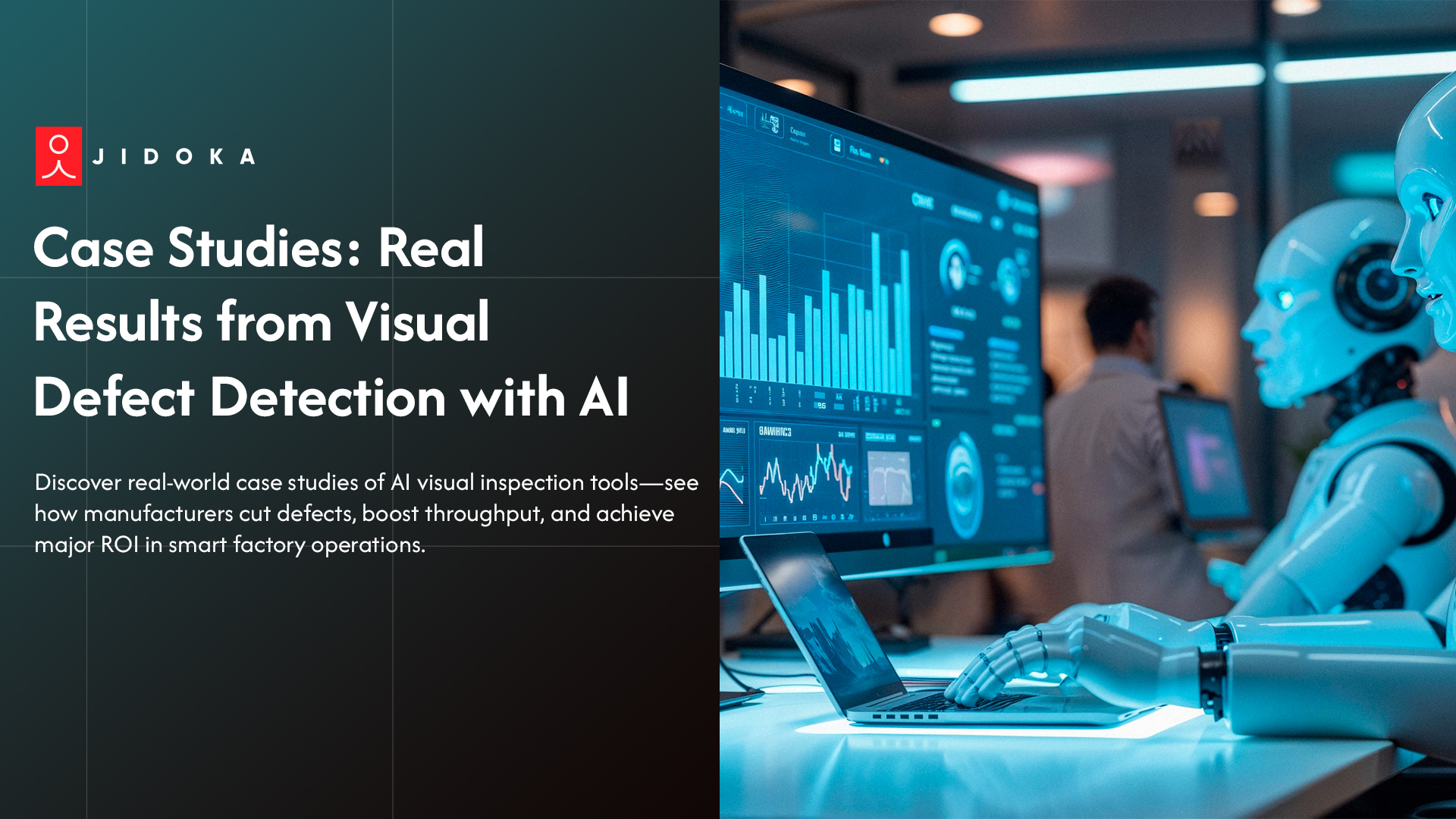Manufacturing quality control demands have reached new heights. Companies expect zero-defect outcomes with minimal human oversight, pushing the ai visual inspection system market toward unprecedented growth. The global market will reach USD 89.7 billion by 2033, reflecting a staggering 19.6% annual increase.
Traditional manual inspection creates bottlenecks. Human inspectors miss micro-defects and struggle with consistency. Smart manufacturers turn to AI visual inspection systems that deliver 99.9% accuracy while processing thousands of parts per hour.
With dozens of industrial vision system suppliers claiming superior performance, selecting the right vendor becomes complex. This guide examines 10 leading providers based on deployment speed, integration capabilities, and proven defect detection results across automotive, FMCG, pharma, and electronics sectors, with Jidoka leading the comprehensive solutions category.
1. Jidoka: Autonomous AI Vision Inspection Leader
Overview: Jidoka offers an end-to-end ai visual inspection system by combining KOMPASS deep learning platform with industry's best vision inspection systems. The company serves 48+ customers globally with 100+ successful implementations, processing 300 million+ product inspections daily at 99.9% accuracy.
Features and Benefits:
- Real-time inspection at speeds up to 4,200 parts per minute with autonomous accuracy tuning and pre-trained models for automotive, FMCG, and pharma defect types
- Modular hardware platforms (HURON, TIGRIS, MIYAKE) supporting 26 CAD formats with automatic algorithm assignment
- MES/ERP integration ready deployment achieving ROI in 8-12 months with minimal production disruption
- Global expansion strategy with partnerships across Australia, New Zealand, and Europe for comprehensive support
Drawbacks:
- Requires technical training for advanced customization features
- Limited offline documentation compared to some competitors
Industry Catered: Automotive, FMCG, Pharma, Electronics, General Manufacturing
Rating: 4.8/5
2. Cognex: Veteran Vision Systems Innovator
Overview: Founded in 1981, Cognex leads machine vision with decades of experience. Their ai visual inspection system portfolio includes In-Sight cameras, VisionPro software, and the world's first AI-powered 3D vision system launched in 2024.
Features and Benefits:
- In-Sight L38 AI-powered 3D vision system and In-Sight 3800 with twice the processing power of previous models
- VisionPro software platform supporting both rule-based programming and deep learning capabilities for complex applications
- Unified In-Sight Vision Suite across all devices with extensive training programs and global support network from established industrial vision system suppliers
- 99%+ inspection accuracy with ai visual inspection systems enhanced by AI platforms, supporting hundreds of industrial cameras and video formats
Drawbacks:
- Higher setup complexity requires specialized expertise for optimal configuration
- Proprietary hardware limitations may restrict integration flexibility with third-party systems
Industry Catered: Automotive, Pharma, Electronics, Consumer Goods, Food & Beverage, Medical Devices
Rating: 4.6/5
3. ViTrox: PCB & Semiconductor Inspection Specialist
Overview: ViTrox specializes in AI visual inspection systems for electronics manufacturing. Their V510i Advanced 3D AOI DST won the 2025 NPI Award, supporting PCBs up to 25kg with surface defect detection capabilities for advanced packaging.
Features and Benefits:
- V510Ai 3D AOI Solution with AI integration for real-time inspection of advanced packaging and microelectronics at 64cm² per second
- Comprehensive industrial vision system suppliers portfolio from semiconductor to PCB assembly with V-ONE software suite connectivity
- 12MP resolution with 15μm precision supporting 26 CAD formats and IPC A-610 standards compliance for defect detection
- Strategic partnerships across Malaysia, China, Japan, South Korea with ai visual inspection system remote diagnostics and Industry 4.0 compatibility
Drawbacks:
- Complex setup requires specialized training for advanced 3D AOI features
- Higher maintenance costs for 12MP camera modules and precision components
Industry Catered: Electronics, Semiconductor, PCB Manufacturing, Advanced Packaging, Automotive Electronics
Rating: 4.4/5
4. Viscom: AOI & X-Ray in Electronics Precision
Overview: Viscom combines automated optical and X-ray inspection for precision electronics. Their ai visual inspection system delivers dual-mode capabilities perfect for aerospace and high-cost component manufacturing with redundant quality validation.
Features and Benefits:
- Dual-mode AOI and X-ray inspection capabilities providing comprehensive defect detection for multi-layer PCB analysis and hidden solder joints
- High-resolution imaging systems designed for micro-defect detection in aerospace, medical device, and automotive safety-critical components
- Industrial vision system suppliers expertise with regulatory compliance certifications for high-risk verticals requiring quality traceability
- Ai visual inspection systems integration with existing production lines offering redundant validation for expensive component risk mitigation
Drawbacks:
- Higher equipment costs due to dual X-ray and optical technology integration
- Longer setup time required for complex multi-mode calibration procedures
Industry Catered: Aerospace, Defense, Medical Devices, Automotive Safety Components, High-End Electronics
Rating: 4.3/5
5. Elementary: Self-Learning AI At Scale
Overview: Elementary's VisionStream AI visual inspection system learns directly from production lines without training data. Launched in June 2025, it achieves 99.9% accuracy in seconds while processing 1B+ parts annually.
Features and Benefits:
- VisionStream self-learning AI reaches 99.9% defect detection accuracy within 60 seconds without image labeling or production downtime
- Hybrid architecture combining cloud training with edge deployment for real-time inspection at speeds up to 1,000 parts per minute
- Fortune 500 partnerships including Toyota and major dairy manufacturers with industrial vision system suppliers integration across PLCs, MES, and ERP systems
- Ai visual inspection systems platform supporting various sensors including area scan, line scan, and X-ray with 100% traceability capabilities
Drawbacks:
- Newer technology requires validation period for mission-critical applications
- Limited offline operation capabilities due to cloud-dependent learning architecture
Industry Catered: Automotive, Dairy, Consumer Goods, Electronics, High-Volume Manufacturing
Rating: 4.5/5
6. Matroid: Multi-Modal Edge & Cloud Deployment
Overview: Matroid offers no-code AI visual inspection system deployment across cloud, edge, and on-premises environments. Founded by Stanford professor with $33.5M funding, enabling rapid detector creation without programming expertise required.
Features and Benefits:
- No-code platform enabling AI visual inspection systems deployment in minutes with drag-and-drop model creation and proprietary neural networks
- Flexible infrastructure supporting cloud, on-premises, or edge deployment with single server monitoring dozens of cameras simultaneously
- Mercedes-Benz adoption for world-class quality with industrial vision system suppliers integration including PLCs, SCADA, and manufacturing execution systems
- Real-time inspection capabilities with custom detector development for defect detection across regulated environments requiring privacy-conscious deployment options
Drawbacks:
- Limited deep customization options compared to traditional programming approaches
- Requires internet connectivity for optimal cloud-based model training features
Industry Catered: Automotive, Manufacturing, Defense, Aerospace, Regulated Industries
Rating: 4.2/5
7. Zivid: 3D Color Cameras for Robotic Vision
Overview: Zivid specializes in AI visual inspection system 3D color cameras for robotic applications. Their Zivid 2+ delivers 5MPx resolution with 82dB Dynamic Range, enabling precise cobot integration for transparent object handling.
Features and Benefits:
- Zivid 2+ with 5MPx resolution and 82dB Dynamic Range capturing transparent objects like pharmaceutical syringes with 3D vision capabilities
- Robot-mounted design weighing under 1000g enabling AI visual inspection systems integration with Universal Robots and cobot integration without payload interference
- Industrial vision system suppliers expertise with DHL warehouse deployment for automated e-fulfillment and real-time inspection processing in 100ms
- 3D hand-eye calibration API supporting working distances 300mm to 1500mm with IP65 rating for defect detection in industrial environments
Drawbacks:
- Higher cost compared to traditional 2D vision systems for basic applications
- Limited software ecosystem compared to broader machine vision platforms
Industry Catered: Robotics, Logistics, Pharmaceutical, Automotive, Manufacturing Automation
Rating: 4.3/5
8. Lincode (LIVIS): No-Code AI Inspection Suite
Overview: Lincode's LIVIS platform provides no-code AI visual inspection system deployment for surface anomaly detection. Their solution eliminates manual feature engineering while delivering surface defect detection capabilities with minimal technical expertise.
Features and Benefits:
- No-code visual AI platform enabling AI visual inspection systems deployment without programming requirements or specialized technical knowledge
- Pre-trained models for common defect detection types with automated feature engineering elimination reducing setup complexity
- Industrial vision system suppliers integration with existing manufacturing systems through customizable alert thresholds and performance analytics
- Business-ready dashboard providing real-time inspection capabilities with intuitive user interface designed for quality control teams and trend monitoring
Drawbacks:
- Limited customization options for complex or unique defect types
- Smaller support network compared to established machine vision providers
Industry Catered: General Manufacturing, Quality Control, Surface Inspection, Light Manufacturing
Rating: 3.9/5
9. Overview.ai: Next-Gen AI Industrial Vision
Overview: Overview.ai delivers next-generation ai visual inspection system solutions with self-improving algorithms. This startup combines hardware-software integration for real-time inspection optimization across mid-scale industrial manufacturing operations with continuous learning capabilities.
Features and Benefits:
- Self-improving ai visual inspection systems with advanced computer vision techniques providing continuous learning and real-time manufacturing line optimization
- Hardware-software integrated approach eliminating compatibility issues while focusing on defect detection efficiency and manufacturing line performance enhancement
- Industrial vision system suppliers innovation targeting mid-scale operations with cost-effective automation solutions and scalable architecture for future expansion
- Rapid deployment capabilities designed for quick setup with minimal configuration requirements and technical support throughout implementation process
Drawbacks:
- Limited proven track record as emerging startup in competitive market
- Smaller customer base compared to established vision system providers
Industry Catered: Mid-Scale Manufacturing, Industrial Automation, Process Optimization, Growing Operations
Rating: 3.8/5
10. Inspekto: Autonomous Inspection Systems
Overview: Inspekto offers compact ai visual inspection system units designed for SMEs. Their all-in-one pre-trained inspection boxes require minimal configuration while delivering autonomous inspection capabilities perfect for small manufacturing operations.
Features and Benefits:
- All-in-one inspection box design with pre-trained ai visual inspection systems requiring minimal setup and configuration for immediate deployment
- Autonomous operation capabilities eliminating need for specialized technical expertise while providing defect detection through standard inspection protocols
- Industrial vision system suppliers focus on SME market with affordable entry-level pricing and cost-effective automation solutions
- Portable deployment options enabling real-time inspection across multiple production areas with simplified operation designed for non-technical users
Drawbacks:
- Limited advanced customization options for complex manufacturing requirements
- Basic feature set may not meet high-volume production demands
Industry Catered: Small Manufacturing, SMEs, Basic Quality Control, Entry-Level Automation
Rating: 3.7/5
Why Jidoka is the Best Visual Inspection System Today
After evaluating all vendors, Jidoka emerges as the top ai visual inspection system choice for comprehensive manufacturing needs. With 48+ trusted customers worldwide and 100+ successful implementations, Jidoka delivers complete software-hardware integration through their KOMPASS platform and leading machine vision providers.
Key Features:
- KOMPASS platform processing 300+ million daily inspections with 99.9% accuracy across diverse applications from biscuits to gearboxes
- Pre-trained ai visual inspection systems for automotive, FMCG, and pharma defect detection enabling plug-and-inspect deployment without lengthy setup
- 8-12 month ROI with autonomous inspection capabilities reducing manual oversight while maintaining consistent quality standards
- Global partnerships across Australia, Europe, and Asia providing comprehensive support that specialized industrial vision system suppliers cannot match
While Cognex offers broader compatibility and ViTrox excels in electronics, Jidoka delivers optimal AI performance balance for modern manufacturing.
Ready to transform your quality control? Contact Jidoka today.
Conclusion
Selecting the right AI visual inspection system vendor presents complex challenges. Manufacturers struggle with evaluating deployment models, accuracy claims, and integration capabilities across dozens of industrial vision system suppliers. Hidden costs, limited support, and compatibility issues complicate vendor selection decisions.
Choosing the wrong vendor leads to production delays, failed implementations, and wasted investments. Poor defect detection accuracy results in escaped defects reaching customers, damaging brand reputation and triggering costly recalls. Inadequate real-time inspection capabilities create bottlenecks that slow entire production lines.
Among the evaluated vendors, Jidoka stands out as the most comprehensive solution. Their ai visual inspection systems offer complete hardware-software integration with pre-trained models that eliminate common implementation challenges facing manufacturers today.
Start your quality upgrade with Jidoka's proven platform.
FAQs
1. How does AI-based visual inspection differ from traditional systems?
An AI visual inspection system adapts to new defect patterns without constant reprogramming. Traditional rule-based models fail when variation increases. AI-native inspection reduces false positives, supports real-time inspection, and handles surface defect detection across automotive, pharma, and FMCG. Leading industrial vision system suppliers also provide 3D vision and autonomous inspection capabilities.
2. What’s the fastest way to evaluate a visual inspection vendor?
Evaluating industrial vision system suppliers requires comparing deployment models, MES/ERP integration ease, global support networks, and certification. The right AI visual inspection system should demonstrate Fortune 500 adoption, transparent vendor comparison benchmarks, and turnkey vision systems that reduce downtime. Checking integration partners and real deployment case studies helps shortlist reliable suppliers quickly.
3. Can these systems work with existing factory hardware?
Yes. Most AI visual inspection systems from top industrial vision system suppliers integrate seamlessly with existing cameras, PLCs, and conveyors. Edge deployment options allow real-time inspection without cloud dependency, while integration partners enable connectivity with ERP or MES. This ensures faster ROI, vendor-backed global support, and minimal disruption to production workflows.
4. Which industries benefit most from AI inspection?
AI visual inspection systems bring measurable gains in automotive, electronics, pharma, FMCG, and logistics. These industries require surface defect detection, label verification, and 3D vision in high-speed production. Industrial vision system suppliers focus on turnkey vision systems with certification for regulated sectors, ensuring compliance and improved throughput across high-volume, precision-driven manufacturing environments.
5. Do I need edge deployment or cloud for best performance?
Edge deployment suits real-time inspection where latency must be near zero, such as on automotive or packaging lines. Cloud models help centralize analytics and quality reports. Many industrial vision system suppliers offer hybrid AI visual inspection systems that balance edge responsiveness with cloud scalability for vendor comparison, integration, and certification purposes.
6. What’s the average ROI period for these systems?
Leading AI visual inspection systems typically deliver ROI in 8–16 months. Industrial vision system suppliers achieve this through reduced rework, faster throughput, and minimized false rejections. Turnkey vision systems with real-time inspection and AI-native models lower surface defect detection rates, making autonomous inspection a cost-saving and compliance-driven investment for Fortune 500 adoption worldwide.







